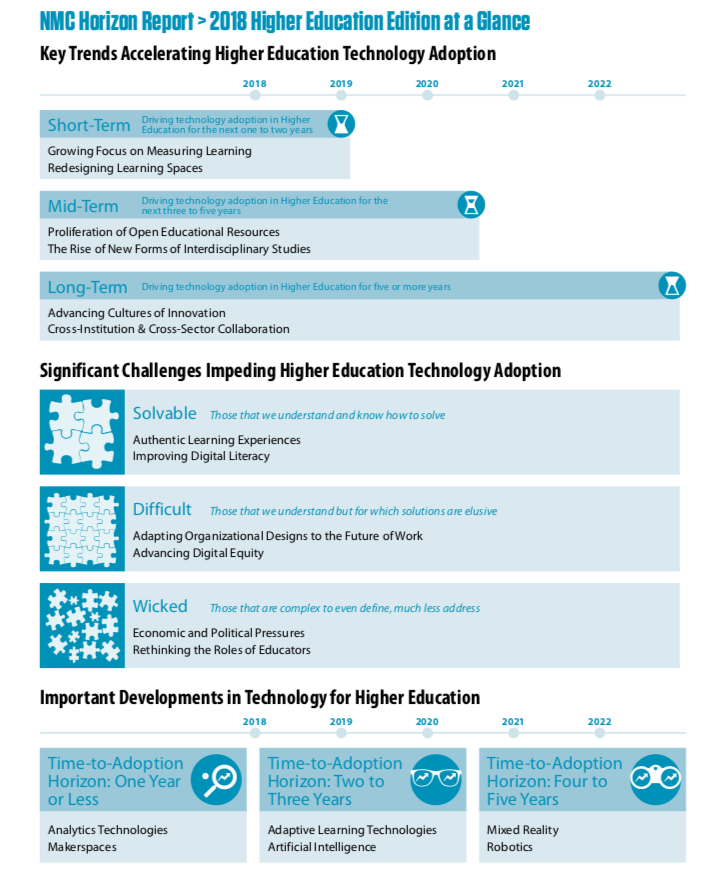You have /5 articles left.
Sign up for a free account or log in.
Have you been spending quality time with the 2018 NMC Horizon Report?
Does the 2018 Horizon Report ask the right questions?
An alternative way to ask this question is what types of questions could the Horizon Report address that would cause academics from outside of the edtech world to read the document?
Can we imagine taking the expertise of campus learning and technology professionals and applying their knowledge to the biggest, broadest, and most difficult questions facing higher ed?
For the backstory on how EDUCAUSE rescued this report, I recommend reading Bryan Alexander’s pieces, including his 8/17/18 post The 2018 Horizon Report Has Appeared, Thanks to EDUCAUSE. I fully concur with Bryan in thanking and congratulating the EDUCAUSE team doing the research, writing, and open release of the 2018 Horizon Report.
The 2018 Horizon Report does a wonderful job of reflecting the thinking of educational technology community. The methodology for researching the report involves contributions of 71 education and technology experts from 19 countries on 6 continents. For a full description of the Horizon methodology see page 50 of the report.
The 4 research questions that the expert panel addressed were:
Q1 - "Which of the important developments in educational technology catalogued in the NMC Horizon Project Listing will be most important to teaching, learning, or creative inquiry for higher education within the next five years?”
Q2 - "What important developments in educational technology are missing from our list?”
Q3 - "What key trends do you expect to accelerate educational technology uptake in higher education?”
Q4 - "What do you see as the significant challenges impeding educational technology uptake in higher education during the next five years?”
From NMC modified Delphi research process, which has been refined for the 16 years in which the Horizon report was produced, a set of trends, challenges, and developments emerge.
The way that the Report organizes the synthesis to answering the research questions is brilliant. If you check out the Horizon Report, you will see that it is laid out in a way that is logical and easy to follow. There are 6 key trends (divided into long, mid, and short terms), 6 significant challenges (divided into solvable, difficult, and wicked), and 6 important developments (segmented by time-to-adoption horizons of 1 year, 2-3 years, and 4-5 years).
I’ll include the infographic summary that is provided in the report below, as it does a beautiful job of capturing all the ideas on a single screen.
How might the trends, challenges, and developments identified by the Horizon Report change if the research questions de-emphasized educational technology as an ends, and instead re-cast technology as a means?
In other words, the interesting questions about the future of higher education have almost nothing to do with technology. Technology is only important as a mechanism, or a tool, to achieve some other goal.
What the goals for higher education should be are not obvious. Should we prioritize students or institutions? Are the needs of one ever divergent from the needs of the other? Are we all about improving access and lowering costs? Or should the focus of higher education be about quality?
In reading the 2018 Horizon Report, I kept wondering if the expert panel was starting with the best framing? Were they being asked the right questions?
Here are 7 alternative questions. They range from very broad to very specific. Thrown in are a couple of questions that I’m particularly interested in. I’m sure that in discussion and debate that we could come up with a set of better questions.
The point is that these are the big questions that I would like to see academics with expertise in technology and learning try to answer.
Alternative Horizon Report Questions:
Alternative Q1: How might economically vulnerable colleges and universities leverage technology to build resilience?
Alternative Q2: What role should higher education technology leaders, and the edtech profession, play in reversing public disinvestment in postsecondary education?
Alternative Q3: What are the unintended consequences of investing in educational technologies to improve institutional productivity?
Alternative Q4: How should should universities decide in building new online programs if it is better to do this on their own, or to partner with an online program management (OPM) provider?
Alternative Q5: Is it actually possible to lower the costs of higher education while maintaining quality, and what role should campus technology leaders play in meeting this goal?
Alternative Q6: What can we do as higher education technology professionals to build true partnerships with professors, while at the same time advancing the goals of improving quality and access while lowering costs?
Alternative Q7: Should learning innovation be a new academic discipline?
What questions do you think the 2019 Horizon Report should ask?





